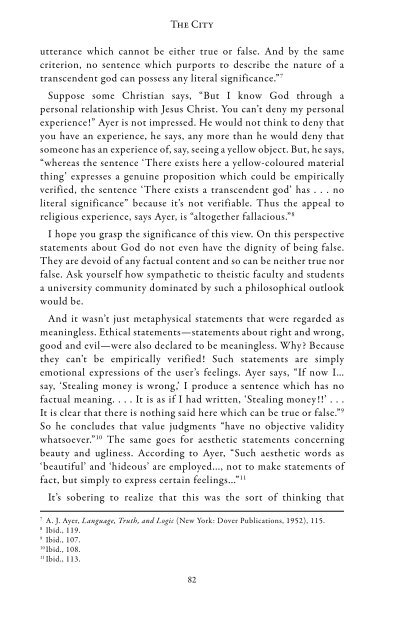THE CITY
h6c7p5d
h6c7p5d
Create successful ePaper yourself
Turn your PDF publications into a flip-book with our unique Google optimized e-Paper software.
The City<br />
utterance which cannot be either true or false. And by the same<br />
criterion, no sentence which purports to describe the nature of a<br />
transcendent god can possess any literal significance.” 7<br />
Suppose some Christian says, “But I know God through a<br />
personal relationship with Jesus Christ. You can’t deny my personal<br />
experience!” Ayer is not impressed. He would not think to deny that<br />
you have an experience, he says, any more than he would deny that<br />
someone has an experience of, say, seeing a yellow object. But, he says,<br />
“whereas the sentence ‘There exists here a yellow-coloured material<br />
thing’ expresses a genuine proposition which could be empirically<br />
verified, the sentence ‘There exists a transcendent god’ has . . . no<br />
literal significance” because it’s not verifiable. Thus the appeal to<br />
religious experience, says Ayer, is “altogether fallacious.” 8<br />
I hope you grasp the significance of this view. On this perspective<br />
statements about God do not even have the dignity of being false.<br />
They are devoid of any factual content and so can be neither true nor<br />
false. Ask yourself how sympathetic to theistic faculty and students<br />
a university community dominated by such a philosophical outlook<br />
would be.<br />
And it wasn’t just metaphysical statements that were regarded as<br />
meaningless. Ethical statements—statements about right and wrong,<br />
good and evil—were also declared to be meaningless. Why? Because<br />
they can’t be empirically verified! Such statements are simply<br />
emotional expressions of the user’s feelings. Ayer says, “If now I…<br />
say, ‘Stealing money is wrong,’ I produce a sentence which has no<br />
factual meaning. . . . It is as if I had written, ‘Stealing money!!’ . . .<br />
It is clear that there is nothing said here which can be true or false.” 9<br />
So he concludes that value judgments “have no objective validity<br />
whatsoever.” 10 The same goes for aesthetic statements concerning<br />
beauty and ugliness. According to Ayer, “Such aesthetic words as<br />
‘beautiful’ and ‘hideous’ are employed..., not to make statements of<br />
fact, but simply to express certain feelings...” 11<br />
It’s sobering to realize that this was the sort of thinking that<br />
7<br />
A. J. Ayer, Language, Truth, and Logic (New York: Dover Publications, 1952), 115.<br />
8<br />
Ibid., 119.<br />
9<br />
Ibid., 107.<br />
10<br />
Ibid., 108.<br />
11<br />
Ibid., 113.<br />
82


